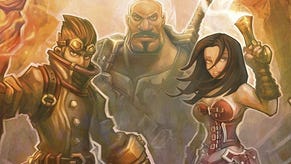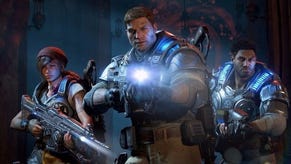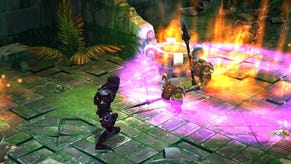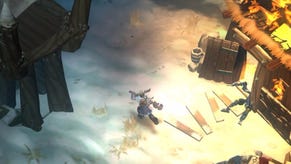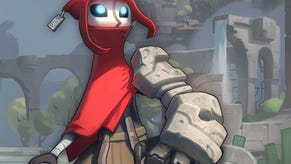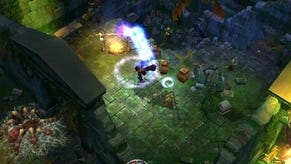Torchlight
Going under-under-under-under-under-underground.
My cat can summon zombies. In a way, that's all I've ever wanted from a videogame - for something to come up with something absolutely, wonderfully, wilfully absurd, and let me achieve it with glorious ease. Something that only a videogame could do. Seriously, my cat summons zombies. I don't even have to tell her to. She just does it, because I've given her the spell to do it. I could summon them myself, but I just can't be bothered to add one more hotkey to my left and right mouse button repetoire. So the game does it for me, via curious cat-based necromancy.
And that's Torchlight all over - it's Diablo run through a "What If?" filter a hundred times over. All you're doing is clicking to kill things and clicking to collect things and clicking to assign stat and ability points - but what if your cat could summon zombies? What if you could fire a giant laser beam from your hands? What if you could wield two enormous wands at once? What if said cat could go sell all your unwanted loot for you? What if someone made a hackandslash RPG whose primary goal was to reward you so insanely often that you became paranoid you'd used up all your lifetime of Christmases in one fell, hyper-colourful swoop?
Torchlight's been available for just a couple of days at the time of writing, but it's been pretty much all PC gamers have wanted to talk about during that time. Understandably so - we've been teased by the bright spectre of Diablo III for so, so long now. Since, frankly, Diablo II, way back in the year 2000. In all that time, we've waited, prayed, begged for something to scratch that same overwhelmingly compulsive itch. We wanted to kill a whole lot of fantasy things very quickly, and we wanted to be given a large number of swords with complicated statistics for doing it. Pretenders have come and gone - the late Iron Lore's Titan Quest generally being considered the most successful - but nothing, really, has quite done it.
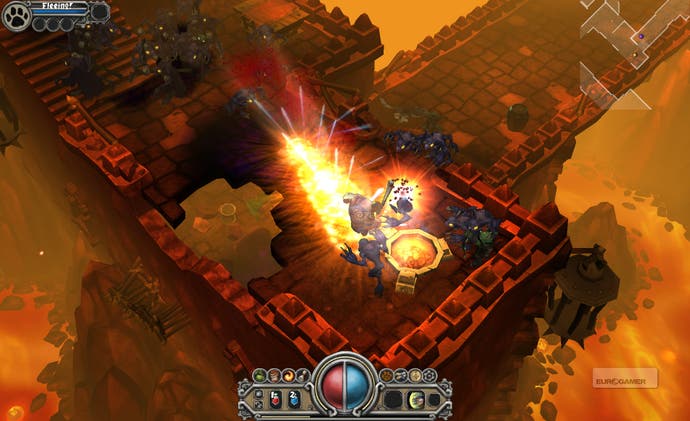
In the wake of Torchlight, the web's filled with guys offering variants upon "I thought I'd play it for an hour before dinner, but when I looked at the time I discovered I'd starved to death because I'd been playing it for three million and twelve years." Great stories. Great, great stories. But, banal as they might sound, they're harrowingly accurate. Torchlight is that game - the one you can't stop playing, because it's based around the two most delectable poles of videogaming: killing and collecting, and the unbreakable bond between them.
It's lately more known as the MMO formula, one oft- and understandably sneered at, but here engineered into an ever-spinning merry-go-round of cheerfully stupid fun. You kill hundreds of goblindogs and evil dwarves and dragonkin and giant spiders because you want a bigger sword/wand/hat. As soon as you have said bigger sword/wand/hat, you immediately crave another one and forge bloodily onwards. It's short-term personal reward at its finest, a perpetual carrot whose only stick is the potential to harm your relationships and exercise quotient.
Torchlight dispenses with anything that could get in the way of this sense of incessant reward. There's the aforementioned pet salesman, you ordering your cat (or dog, if you're some sort of sick, twisted deviant) to run off and flog anything you don't need while you're still mid-dungeon, returning with empty bags but a big pile of cash a couple of minutes later. It's a feature lifted wholesale from Fate, an olden RPG by one of Torchlight's main chaps, but its return here is enormously welcome, avoiding the aggravating inventory Tetris of so many of this game's more fiddly peers. Furthermore, any of TL's three character classes can use essentially any item in the game, so long as they've poured enough stat points into strenth, dexterity, magic or defence.



